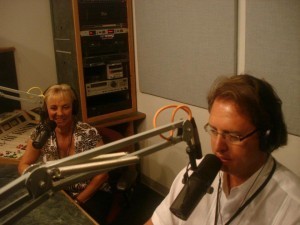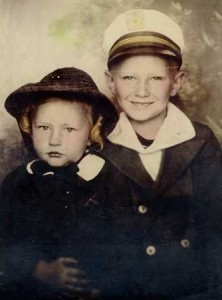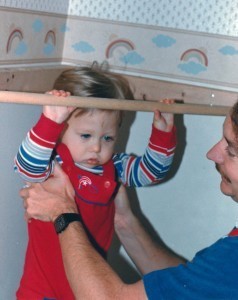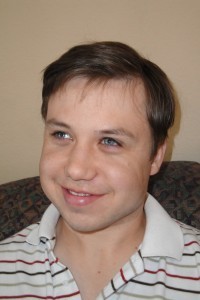Stephen Gallup's Blog, page 8
July 24, 2012
Heartfelt poetry from Nina Ni, mother of an autistic son
 This is our first time using content provided by someone else. Nina is the mother of an autistic son. She’s originally from China and has lived in Scotland for the last few years, where she’s maintained an online Chinese-language discussion forum on biological interventions for autism.
This is our first time using content provided by someone else. Nina is the mother of an autistic son. She’s originally from China and has lived in Scotland for the last few years, where she’s maintained an online Chinese-language discussion forum on biological interventions for autism.
Nina writes, “Please feel free to help me polish it since you knew I’m Chinese lady and I never wrote English poems before … I had really too much feelings.” I did fix spelling and punctuation in a couple places but, for me, this makes its point eloquently just as it is. What do you think?
I feel controlled by an evil spirit
by Nina Ni
I feel I controlled by an evil spirit,
Since I’m controlled by my beloved son.
My beloved autistic son seems controlled by a strong evil.
In deep silent night, everybody in deep sleep,
But my beloved son looks like a guest.
Wandering in midnight in every room,
He screams, he smashes,
Breaking the silence of the peace night,
Making our hair standing,
Making our heart break.
I feel I controlled by an evil spirit,
Since I’m controlled by my beloved son.
My beloved autistic son seems controlled by a strong evil.
At home, everybody enjoy peace and happiness and relax,
But the evil drive him crazy.
The evil asks him to break every piece of property at home:
Keyboards, computers, mobile phones, lamps, glasses, plates,
Mugs, books, doors, ceilings and floors and his own favourite games etc and etc.
Everything broken made him such big happy.
It is his way to release his feeling.
I don’t know how our human society made in him such big angry.
He can’t see sunshine now
Even it is big sunshine outside.
He closed his eyes in school.
The word he often speaks now is “dark.”
I feel I controlled by an evil spirit,
Since I’m controlled by my beloved son.
My beloved autistic son seems controlled by a strong evil.
I’m a normal human, I’m weak,
I’m sick, I’m dizzy, I’m vomit.
But the evil drive him to force me to drive and drive for him,
To shopping and shopping for him.
I’m breaking down, I’m feeling nearly die.
But my son’s evil still drive him, saying:
“Not allow mum to have any peace at home,
Kick her, pull her, bite her, smash home,
Annoy her overnight.
She will surrender.”
I’m human,
I’m surrender,
I work as slave and in danger.
I feel I controlled by an evil spirit
Since I’m controlled by my beloved son.
My beloved autistic son seems controlled by a strong evil.
When my son smashes,
I try hard to stop him:
“No and No.”
But human voice is so weak
When you say “No and No,”
He smashes More and More.
When my son smashes,
I used to explain him gently:
“This is our home.
Everybody needs to love home.”
But human normal theory can’t make him understanding.
When my son smashes
I used to kneel down with tears.
“Son, please, please no more smashes at home.
Mum is begging you.”
But human feelings can’t move him.
What I saw,
In his young face is full of numb.
Evil is laughing,
But I’m crying.
I feel I controlled by an evil spirit,
Since I’m controlled by my beloved son.
My beloved autistic son seems controlled by a strong evil.
Every time, when I have to leave home to give myself space,
I feel I’m released, I’m escaped.
I ask myself why and why and why.
Oh, It is my beloved home.
He is my beloved only son.
I wish to be with him every moment.
I wish to spend every holiday with him.
I wish to spend every weekend with him.
But why I have to tried so hard to escape him like to escape a devil?
I feel I controlled by an evil spirit,
Since I’m controlled by my beloved son.
My beloved autistic son seems controlled by a strong evil.
I saw lambs eat grass peacefully.
I saw cats sleep soundly.
I saw dogs catch the balls happily.
I saw children play in parks joyfully.
Why my son like a crazy dog keep bark and bark?
Why my son like a wild horse total out of control?
For such and such a long time,
It challenges
Human normal education way.
It challenges
Modern care systems.
It challenges
NHS process way.
I feel I controlled by an evil spirit,
Since I’m controlled by my beloved son.
My beloved autistic son seems controlled by a strong evil.
I’m praying and praying.
“Son, when your soul can wake up?
You are growing up.
You shouldn’t just live for your obsession,
For your rote and compulsory behaviour.”
I’m praying and praying
When our modern society
Can find a solution for autism.
I’m praying and praying
When our modern society
Can have more flexible emergency care system to help
The family who suffer and struggle and approach risk daily like us.
I feel I controlled by an evil spirit,
Since I’m controlled by my beloved son.
My beloved autistic son seems controlled by a strong evil.
I’m praying and praying
Please give us peace and peace
I wish:
Peace home,
Peace night,
Peace sleep,
Peace soul,
Peace son,
Peace to have a cup of tea,
Peace to walk in the park in sunshine day,
Peace to watch TV,
Peace to use Internet.
Peace is Your great present to human
But it is so precious for me now.
Oh God,
Is this way that you test my faith?
Oh God,
Is this the way you try to make my spirit stronger?
I’m suffering.
I’m through the darkness now.
I’m in ordeal.
I feel I controlled by an evil spirit,
Since I’m controlled by my beloved son.
My beloved autistic son seems controlled by a strong evil.
If there was an evil exist,
Please release from my son.
Every child is innocent.
You shouldn’t catch them.
Children should be happy and enjoy their young life.
If there was an evil exist,
Please release from my son.
Please allow my son open eyes in school to play with other children happily.
If there was an evil exist,
Please release from my son.
Please open my son’s mouth to let him speak the word “Sunshine.”
Oh, my dearest God,
Please listen our prayer.
Please using your strong power to
Remove the darkness and evil spirit from our life.
Please deliver
Your joy and happy and peace to every family who are calling on You.
June 6, 2012
Thoughts prompted by a pioneer on getting from here to there
Henry Ford, the entrepreneur who showed a younger world how to get things done in a big way, has been credited with this gem of wisdom: “If you think you can do a thing or think you can’t do a thing, you’re right.”
I was reminded of that today when writing a short remembrance of another pioneer, Ray Bradbury. The story in WATB, and my ongoing ruminations about what it means, amount to an exploration of the limits of what we can do.
Here are more nuggets from Mr. Ford, and my current thoughts on their application:
“Time and money spent in helping men to do more for themselves is far better than mere giving.”
To me, this is a variation on what Glenn Doman said back in 1986: that the right objective for Joseph was that he be “an answer to the world’s problems, rather than another of its problems.” I understand that some disability and diversity advocates see things a little differently. My short answer to them is that it boils down to having options. Someone who has the choice of affecting the world around him is better off than someone who depends on that world for everything that happens. Assuming he makes wise choices, other people are better off as well.
“I cannot discover that anyone knows enough to say definitely what is and what is not possible.”
When Joseph was one year old, his doctors transitioned from telling us to be patient and hope for the best into telling us to get counseling, so that we could cope with the fact that nothing could be done for him. At least, they proposed doing nothing for him, and they warned us to stay away from any alternative providers who might have a different take on the situation.
Those doctors lost all credibility in our eyes when alternative providers did in fact help him.
Did the alternatives have all the answers we needed? No. Were they as smart as they seemed to think they were? Alas, they were not. This was doubly disturbing, since they claimed as adamantly as had the original doctors that no answers existed outside their own specific realm. Again, we were advised not to look elsewhere.
If we had been less motivated and more convinced that we were getting the complete picture, we might have reacted differently. But when you have a problem that you feel absolutely must be solved, and the known resources for solving it no longer inspire confidence, something happens in your head. At least, something happened in our family. We set out on a quest for answers with no guidance beyond what felt right.
Were we smart enough to do that? Probably not. But we didn’t want to give up without establishing for ourselves the potential of every plausible course of action. I cannot regret our choices.
“There is joy in work. There is no happiness except in the realization that we have accomplished something.”
When I’m asked to talk about WATB, a point I always try to make is that, despite having a child with profound developmental problems, and despite being busier than we’d ever been in our lives, Judy and I spent a great deal of the time feeling extremely happy. Optimism reigned in our household. Volunteers who came to see us felt energized, and no doubt that was the reason many of them kept coming. We believed fervently in the rightness of what we were doing. We saw evidence in our son that reinforced that belief. Those days were an extraordinarily upbeat time in our family’s life, and I look back on them with wonder.
“Thinking is the hardest work there is, which is probably the reason why so few engage in it.”
It isn’t easy to think when in the thick of battle. We start off with basic instincts and notions of what’s right, and that’s what informs a lot of the decisions we make along the way. But the writer writes to teach himself, and a lot of my deeper thinking on the subject of our campaign took place as I was putting my book together. Further insights continue to take shape as I blog about the story. This is not a linear process. Time passes with no new insights. But then something clicks and my understanding acquires new depth.
This latter phase was optional. The story could have ended without my ever having digested or told it. I have benefitted personally from going back over it. My hope is that readers following the thinking that it dramatizes will see things anew as well.
“Failure is only the opportunity to begin again, this time more intelligently.”
By current standards, the first motorized quadicycle Henry Ford built wasn’t much of a vehicle. The first car company he put together didn’t exactly work out for him, either. The same can be said for the first several attempts Judy and I made to help Joseph. We took our son to doctors and therapists who, quite frankly, had other priorities that prevented them from giving his case the kind of attention it needed. We saw other providers whose frame of reference was too narrow, if not altogether wrong.
Every time a resource disappointed us, we looked for another. We looked to ourselves, as well, because early on it became obvious that nothing was going to happen that did not involve major effort on our part.
Several milestones and several plateaus later, to use automotive metaphors, we ran out of gas. We reached the end of the road. If further progress for Joseph is yet possible, the route it will take has not yet been surveyed.
However, my pledge to my son, alluded to in the book’s subtitle, is that I remain poised to resume the effort when a new course of action looks promising. I will do so armed with everything learned along the way. The result might yet be an answer to the world’s problems.
May 21, 2012
Where do we stop? Where must we stop?
 I took a day this past weekend to sit in on a conference entitled “Frontiers in Neural Disorders,” which brought together some researchers I’ve known about for many years.
I took a day this past weekend to sit in on a conference entitled “Frontiers in Neural Disorders,” which brought together some researchers I’ve known about for many years.
I took notes, as I always do in situations like that. (I really think I missed my calling in life, because my interest in this sort of thing goes well beyond any hope of its being of practical benefit to anyone I know.)
I could report here about the general thrust of what was said about autism, schizophrenia, Alzheimer’s, bipolar disorder, ALS, etc. (if you’re curious, let me know and I’ll be glad to send my notes.) At the moment, however, I’m thinking about a short conversation I had there with Alan Lincoln, one of the presenters. I reintroduced myself and said I went to see him several years ago on Joseph’s behalf. Dr. Lincoln is a clinical psychologist with a special interest in autism, and probably at the time (early 90s?) I was hoping for an entrée into the world of behavior mod as had been introduced by his colleague Ivar Lovaas. I remember at that previous meeting he wrote down everything I said, and subsequently he turned us over to a younger therapist. (That experience was interesting, but I think our family was too far along — i.e., too worn down and with a son already too old — to benefit from it.)
Dr. Lincoln claimed to remember my name, and naturally he asked about Joseph’s current status. I speculated that Joseph had decided somewhere along the way that he was done with making extraordinary efforts to overcome his disability. This perception did not surprise Dr. Lincoln at all. He commented that no one wants to work at full throttle all the time. As soon as the structure of a daily program is removed (if not before), patients like Joseph often revert to what they find most comfortable. What results may not be our own idea of a good quality of life, but to some extent it may reflect a choice they have made.
It’s interesting that my wife, on that same day, went to a different presentation, to learn about enhancing our daughter’s academic success. And one of the points she brought home from that was that even whiz kids can reach a dead end when they get out from under the influence of constantly hovering parents — if they lack inner motivation. The primary challenge for the parents, then, is to bake in that motivation.
There seems to be a parallel. Of course, we all have a point beyond which we cannot go. Free will plays a part, too. Parents want both success and happiness for their kids. We can argue the objective merits of our idea of success, and insist that our kids share that idea. At least sometimes, parents know best. But sometimes, for one reason or another, the kids are going to take a different path.
And we’ve got to find a way to be at peace with that.
May 7, 2012
Win a free ebook
For the month of May*, anyone who completes this puzzle correctly (per my answers) and sends it as an email attachment to kidsbright at gmail dot com will get an ebook of What About the Boy? in either Kindle or Nook format, or as a .pdf file (your choice). A degree in English is not necessary, although having read a bunch of books would surely help.
* Or until I take it down, if it turns out to be too easy!
(I admit that a tighter format, like they have in newspapers, would have been more attractive and perhaps less ambiguous. Also wish it were easier to generate something you could complete and submit online. However, I’m new at puzzle making, and this is the best I could do in the time available.)
Just click the image below to open and then send to your printer.

Across
Down
1. Wrote Westerns
2. Wrote about someone who shrugged
4. Had a dragon tattoo
3. Contemptible creature to Swift
6. Rabbit did this
5. Had a daughter problem
8. Whale hunter
7. Worn by a cat
11. Dwelt by a pond
9. Traveled the U.S. with his master
12. “The past is not dead. It is not even ____.”
10. Ventured into the heart of darkness
13. Wrote a haiku in the metro
14. Ode on a Grecian ___
16. Premier authority of English
15. Pondered a road not taken
18. A proud and loquacious rooster
17. Meek folk of the future
21. Young Baggins
19. A lonely hunter
23. Nevermore will he write
20. Penned by the wife of a poet
24. Sought by worthy knights
22. Visionary rabbit
25. Still waiting for him
23. A story needs this
26. Many poems have this
28. The cruelest month
27. Setting of some Burroughs tales
29. ____ Kampf
29. Whitman said “I celebrate ______”
30. Scandalous novel of the 50s
31. Lysistrata led the women on ______
33. Bad guy in Othello
32. Utopian novel with anagram title
35. The ___ Sleep
34. Was translated by a committee
37. Went down the river with Huck
36. Dynamic leader who gave Joseph’s parents hope
37. Not as desirable a name as Ernest
May 4, 2012
May 3 interview on Senior Voice America
 The host of this show, which is nominally for an older audience, asked for thoughts that might be useful to grandparents of a disabled child. My basic response to that was:
The host of this show, which is nominally for an older audience, asked for thoughts that might be useful to grandparents of a disabled child. My basic response to that was:
“Emotional support is golden. Anything you can do that’s constructive is probably going to be welcomed. For grandparents, my advice would be: Please do not suggest that you think this is anybody’s fault. For example, if your son is the father of the child who has problems, please don’t hint that, well you know, the mother’s family is kind of strange, so probably it’s something from that side, or vice-versa. That kind of thing is not going to help anybody. The idea is to help both of them cope, and then to offer whatever additional assistance you think you can.”
Unfortunately, the audio file is too large to post here. However, you can Click here to read the transcript.
April 27, 2012
April 24 interview with Bill Xam
This interview didn’t follow any particular format, but Mr. Xam managed to touch on all the bases in a way that made it easy for me to give, I hope, helpful answers. I cannot pass on quoting the comment he makes at the end, after I’ve signed off: “The book is in my opinion more than worthy of reading. I believe that this book will shift the paradigm of how you think, as it did for me. For me, it was a very spiritual experience. I read the book, and you should, too.”
March 29, 2012
What might have been
Parents of kids with developmental issues tend to hate events like birthdays. We hate intrusive reminders that time is passing and that an ever-widening gulf separates our child from his peers.
This disturbed Judy, when Joseph was little. Personally, I felt it more keenly when he entered his teenage years (probably because, prior to that time, I'd expected to see him overcome everything). (WATB shows how I held onto that optimism.)
But later, every time I noticed that my son was really not a bad-looking guy, I thought of the girls who would've been calling him. If he could talk to them, that is. I also thought of the buddies who might have been coming round to share fascinations with bands or computer games or cars or other hot topics du jour. I thought of the school projects that might have prompted him to seek my help, during which we might have enjoyed a little extra bonding before he ventured out into the broader world.
By now, he'd most likely be finished with school and launched into a career of one sort or another. He might be married–might even have a kid, although historically the generations come pretty far apart in this family. I was in my mid-thirties at Joe's birth, and in my fifties when his siblings joined us. I don't know why, but previous generations followed a similar pattern.
Come to think of it, the repetition is almost uncanny. I have three kids. My father had three kids. His father had three kids. There is some repetition of names, but that part is intentional. On the other hand, how do we account for the fact that the first child born to my grandparents also had a blighted life? From what little I know, Anna was sickly and died–I think of pneumonia–when she was still very small. Go back another generation and the oldest son drowned in a river while swimming with friends. That was way, way before my time, but a brittle newspaper clipping says the parents were "well-nigh crazed with grief." Prior to that, I think there was a boy who died when a load of hay bales tumbled off a wagon onto him, but that far back the details have been lost.
Except in my own generation, something prevents the oldest of each set of kids in our family line from meeting the normal hopes and expectations a new birth inspires.
In bygone times, someone might have called that a curse. Because no explanation is available, I have to see it as chance. Although "chance," as an explanation for bad outcomes, doesn't satisfy me.
The story in WATB–and here I'm thinking especially of the chain of events that resulted in the births of our two younger kids–is the story of one "if" piled on top of another. If even one apparently random event had not occurred, life would have taken an altogether different direction for us. So one might also wonder, even at this late date, how events might have unfolded without the above tragedies–if my aunt, Anna, had survived childhood, and Vance before her, and the other boy before him. And if Joseph were more actively involved in the world right now.
Who else might be benefitting?
March 12, 2012
When doctors get it wrong
In part, WATB concerns the experience of begging our son's doctors for help with a major problem, discovering that those experts had no idea of how to treat the problem or even much curiosity about it, and then looking elsewhere for answers.
The book includes a scene in which a newspaper reporter is interviewing me about the unconventional treatment my wife and I selected. He has already checked with a local pediatric neurologist, who informed him that we are wasting our time. Therefore, his line of questioning is confrontational. Why do we insist on ignoring professional advice? I point out that the professional advice had been to do nothing and accept our son's undiagnosed condition as a fact of life, whereas the alternative approach we have taken is already bringing about wonderful improvements in his abilities. This claim means nothing to the journalist. Who am I, a nonprofessional, to say that my son is better or that it is due to this crackpot intervention?
Afterwards, Judy and I felt foolish for having let the guy draw us into an argument. We didn't need to defend our choice. We only needed help for our son. At that point, anyone claiming superiority to the resource we were using would have to show us something better than mere credentials.
Still, over time we had more discussions like that, with nurses, relatives, even casual acquaintances. Their challenges had the effect of backing us into a corner. Nobody was going to make us give up this program! Even when the passage of time did not offer much assurance that the program would accomplish everything we'd hoped for.
When we did reluctantly give it up, we continued to believe another unconventional solution would pick up where the first had left off. We would discover what to do via the same determination and common sense that had gotten us to that point. We did occasionally check in with mainstream doctors, but our alienation from them was almost complete.
A better outcome should have been possible. The following thoughts are addressed primarily to professionals. I hope there is someone out there in a position to learn from our story and from this list of conclusions:
Healthcare is a partnership.
Much is written about the necessity for patients to communicate with their doctors, but in my family's experience, it was the docs who went silent. In doing so, they didn't advance the partnership. Instead, they removed themselves from it.
Where WERE you guys? Maybe our expectations were not entirely realistic, but we should have had received more support and guidance than you offered.
I think you had other priorities. Maybe you couldn't spend the time necessary to understand our son because you needed to clear out that waiting room. Yes, you ordered some tests; the results were either negative or inconclusive. Did the absence of a diagnosis and treatment protocol excuse you from thinking about the case more creatively? Sometimes you claimed to be hopeful that things might spontaneously improve. Maybe each of you really hoped we would continue taking our problem to somebody else. All the explanations I can think of amount to lame excuses.
It's not about your career or professional reputation.
We all have a tendency to take ourselves too seriously. I think what we do is more important than who we are. Doctors, if helping your patients is not the first priority, I would appreciate a little enlightenment on what ranks higher.
When we were looking desperately for a way to help our son, one pediatrician mentioned cryptically that "there are programs out there for children like yours, but I'm not going to say anything about them." Presumably, she feared censure for pointing us toward an intervention that was not endorsed by her peers. Somewhat later, when he first heard our description of what we were doing for our son, the family GP said he knew nothing about it but concluded, "If it's working, go for it!" Later, notified that our program was frowned upon by the American Academy of Pediatrics, he changed his tune. But he never gave it any serious thought, never saw the need to learn enough to take a real stand, even though our son was his patient.
Don't overestimate your own level of smarts.
One of the first potential treatments we learned about on our own was a medication called Piracetam, which reputedly enhanced the supply of oxygen to neural cells and possibly supported language acquisition. It was not available from pharmacies here in San Diego but could be bought over the counter in Mexico, which wasn't far away. We mentioned it to our son's neurologist, thinking he'd be up to speed on the subject. "Never heard of the stuff," he said proudly. End of subject. Clearly, anything he'd not heard of was not worth hearing about. This despite the fact that Piracetam had been the subject of a recent study at the local children's hospital. We'd already read the study. My wife had phoned one of the researchers involved.
The doctor's confidence that he knew everything worth knowing would have impressed us more if he was offering a reasonable alternative. So do you think we visited a Mexican farmacía and began medicating Joseph ourselves? You'd better.
Bad-mouthing your competition is unbecoming.
I've found this habit particularly noticeable among altie providers, those offering off-label hyperbaric oxygen, auditory therapy, fetal cell therapy, etc. When we browsed among them, we repeatedly found practitioners haunted by jealousy of competing clinics. They spoke resentfully of people who had stolen their ideas or who made claims that only they themselves had the right to make. They gave the impression of not having the resolution of our son's problems as a high priority.
All these errors on the part of healthcare professionals have the effect of making patients feel very much alone. In a sense, feeling alone is getting a glimpse into reality. Help from one human to another can go only so far. But I think patients have the right to expect a good college try at providing that help first.
Now as the patient, or rather the father of the patient, I too screwed up. Deprived of the benefit of your expertise, I had to rely only on my own reasoning and my own sense of what felt right. But my mistakes were the result of ignorance. Yours amount to abdication.
March 5, 2012
Happy birthday, Joseph
Twenty-seven years ago today, your arrival made me as happy as I have ever been. I hope you are that happy today.
February 28, 2012
Feb 29 interview with Susan Sohn
 I hope you will have time to listen live to this broadcast (beginning 8:30 a.m. PT Wednesday), as there will be opportunities to call in or submit questions/comments via the Net. Whether in real time or archived, the audio will be available by clicking the image to the left.
I hope you will have time to listen live to this broadcast (beginning 8:30 a.m. PT Wednesday), as there will be opportunities to call in or submit questions/comments via the Net. Whether in real time or archived, the audio will be available by clicking the image to the left.







